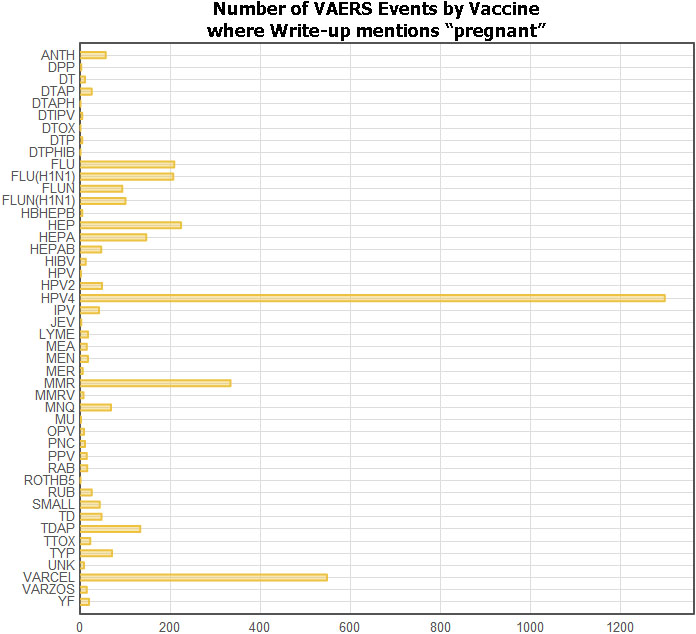
Information Center
Your Health. Your Family. Your Choice.
 |
National Vaccine Information Center Your Health. Your Family. Your Choice. |
The MedAlerts Blog |
Is it safe to get a vaccination when you are pregnant? The conservative answer is "no", but there may be degrees of danger for each different vaccine. Given the testing used by pharmaceutical companies, and the general practice of excluding pregnant women from pre-licensure clinical trials, it's not possible to establish with certainty how safe - or unsafe - various vaccines are for fetal and maternal health. So this month I will look at VAERS to see which vaccines have the most reports involving pregnancy.
There is no reliable way to say whether a VAERS report involves a pregnant woman because it is not one of the questions asked by the government. However, a simple approach is to search the Write-up for the word "pregnant" (the Write-up is a multi-paragraph description of the report). Here is a Graph of Vaccines with the word "pregnant" in the Write-up field of Section 2 (Symptoms):

Also of interest is the fact that the number of VAERS reports is the same for both Seasonal Flu (FLU / FLUN) and H1N1 Flu (those with "H1N1" in their name). But again, the Seasonal Flu data accounts for 20 years of reporting whereas the H1N1 Flu was identified separately in the VAERS data for just 1 year. Could the H1N1 Flu vaccine have done 20 times as much damage to pregnant women as the Seasonal Flu vaccine? My November, 2010 blog has something to say about that.
The results seem pretty damning for Gardasil and the H1N1 Flu vaccine. But what about the initial question concerning the validity of the search...does typing "pregnant" into the Write-up field really find pregnant women? To find out, there is a new analysis feature in MedAlerts which shows the context of a Write-up search, so you can see the surrounding words. To use this feature, check Expert Mode, make a Table of Write-Up Context (3 words), and search for the Write-up term "pregnant". Also, select the Vaccine "HPV4". This will analyze only those Gardasil-related reports that have "pregnant" in their Write-up.
The resulting table shows all of the context of the word "pregnant".
The top 20 results (in order of frequency of occurrence) are:
that she was pregnant at the time (appears 8 times)
the patient was pregnant at the time (appears 7 times)
the patient was pregnant at the time (appears 7 times)
the patient was pregnant when she received (appears 5 times)
the patient became pregnant.
The patient's last (appears 5 times)
that she was pregnant.
No adverse effects (appears 5 times)
who was not pregnant and who was (appears 4 times)
the patient was pregnant.
The patient's last (appears 4 times)
the patient became pregnant.
The patient's last (appears 4 times)
out she was pregnant.
Her LMP was (appears 4 times)
was 5 weeks pregnant.
The patient sought (appears 3 times)
the patient was pregnant.
The patient was (appears 3 times)
the patient was pregnant.
Her LMP was (appears 3 times)
the patient was pregnant.
At the time (appears 3 times)
the patient was pregnant.
The patient's last (appears 3 times)
the patient was pregnant when she was (appears 3 times)
the patient became pregnant after receiving the (appears 3 times)
the patient became pregnant after receiving GARDASIL.
(appears 3 times)
product, concerning a pregnant female patient who (appears 3 times)
the patient was pregnant when she was (appears 3 times)
Only one of these shows that the patient was not pregnant, and that happens only 4 times in the data. Two other contexts refer to someone who became pregnant after the vaccination, but this may still be relevant. A complete examination of the results shows that 66 out of the 1290 matches suggest a patient who was not pregnant. This is just 5% of the results and is not significant-enough to invalidate the graph.
So if you are pregnant (or even think you might be pregnant) talk to your doctor and other health professionals before getting a vaccine, especially Gardasil or the current Flu vaccine which has the H1N1 serum in it.
<< 9/2011: Flu season preview 11/2011: Pregnant women and HPV >>
Copyright ©
2024 National Vaccine Information Center. All rights reserved.
21525 Ridgetop Circle, Suite 100, Sterling, VA 20166